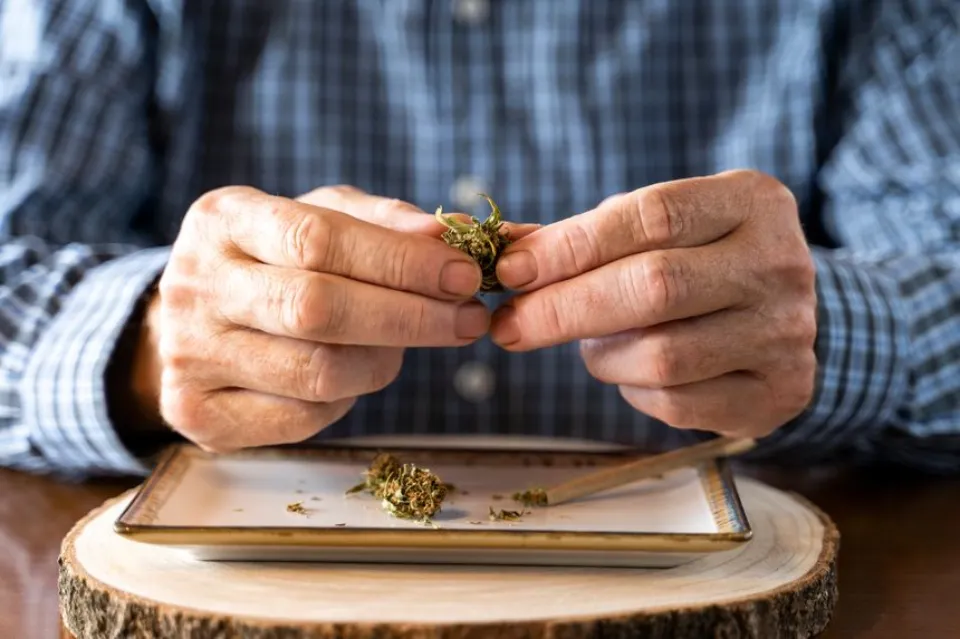Marijuana Risks Can Hit Older People More Than Younger Ones
The use of cannabis by seniors is increasing, and doctors are highlighting potential risks that may affect seniors more severely than younger users.
Due to their increased availability in convenient dosage forms like edibles and legalization in more states, marijuana and CBD products are now used by middle-aged and older adults more frequently than ever before. Most seniors who use them claim to do so to help with pain, anxiety, or sleep problems.
For older people, cannabis use can present unique risks. It can conflict with other medications, which is problematic for seniors who frequently take several prescription medications. The risks of injuries, falls, anxiety, and confusion can all be increased by marijuana use. The issue is made more challenging by the fact that many seniors might be reluctant to disclose their use to their doctors.
According to a study released in January by physicians at the University of California San Diego, the number of emergency room visits in California for cannabis-related issues among adults 65 and older increased from a rate of 20.7 per 100,000 visits in 2005 to 395.0 per 100,000 in 2019.
Although marijuana products have some health risks, most seniors who use them are doing so to try to manage other health issues. According to a 2020 study published in the Journal of the American Geriatrics Society, 15% of a group of close to 600 adults over 65 said they had used marijuana within the previous three years.
Almost 80% of those seniors claimed to use cannabis for medical purposes, with pain, sleep, and anxiety being the main justifications given. The majority claimed that their family members were aware of their usage, but only 40% admitted to telling their healthcare providers.
“They are seeking a means of treating these troublesome conditions for which the medical therapies we have are not terrific or difficult to access,” says Professor and department head of geriatrics, gerontology, and palliative care at the University of California, San Diego, and senior author of the study, Alison Moore.
Buying from a licensed marijuana dispensary helps ensure the products have been through quality manufacturing practices.PHOTO: MICHAEL M. SANTIAGO/GETTY IMAGES
What Seniors Should Know About Marijuana
The primary psychoactive substance in marijuana, known as THC, is what gives users a high. Another substance found in the cannabis plant called cannabidiol, or CBD, doesn’t give users the same high that THC does. Both THC and CBD are present in many products.
THC and CBD in particular interact when you eat something containing cannabis with the liver’s drug-metabolizing enzyme system. Staci Gruber, the program’s director for the Marijuana Investigations for Neuroscientific Discovery program at McLean Hospital in Belmont, Massachusetts, claims that this can alter the amount of the drug in your system, changing its potency.
In the short run, marijuana also has an impact on your cognitive functioning. Aging adults may be more susceptible to the harmful effects of THC due to physiological and brain changes, according to Ziva Cooper, director of the UCLA Center for Cannabis and Cannabinoids. However, some studies have shown that giving older mice THC appears to slightly improve their cognitive outcomes, according to Dr. Cooper.
In an older body, marijuana’s effects may last longer. Our metabolic rate slows down as we age. Consumables like popular goods must be digested. According to doctors and researchers, the effects of THC can last up to eight hours or longer, and even longer in elderly people.
“Slower metabolism can result in a slightly greater impact of the products,” says Dr. Gruber.
Higher impact may increase the risk of THC’s negative side effects, such as delirium or even increased heart rate and dizziness, which can affect balance.
It is critical to understand the THC content of products. It can be challenging to confirm that the information on the label is accurate because marijuana products aren’t strictly regulated. Buying from a licensed dispensary helps ensure that the products have undergone quality manufacturing procedures and been tested for potency and purity.
How Adult Children Can Help
Encourage your parents to speak with their doctor if they use marijuana or CBD products so that they can be sure they are aware of any risks and how it might affect any other medications they are taking. According to Benjamin Han, a geriatrician at UCSD, many adult children purchase products for their parents without realizing that the dose and type have different effects.
“If older adults are considering trying cannabis for medical reasons, it is important for them to treat it like any other medication that may have side effects or interact with other medications,” says Dr. Han.
Ask your parents why they use marijuana to find out if there are any health issues that might be better handled with other therapies, advises Dr. Moore.
And advise parents to “start low and go slow,” or take a low dose at first and increase as needed, says Cannabis researcher Tory R. Spindle is an assistant professor at the Johns Hopkins University School of Medicine. Inform parents not to drive while intoxicated and be aware of potential cognitive and motor impairment.



